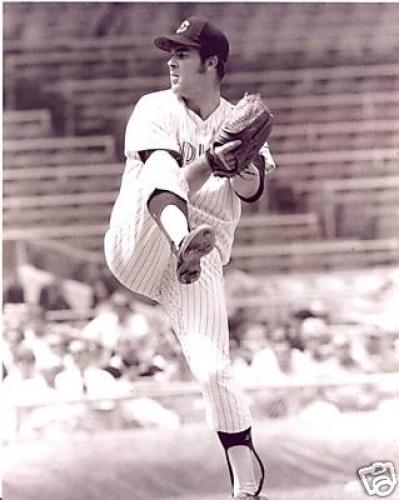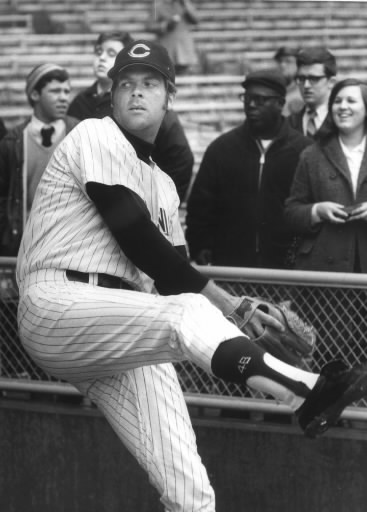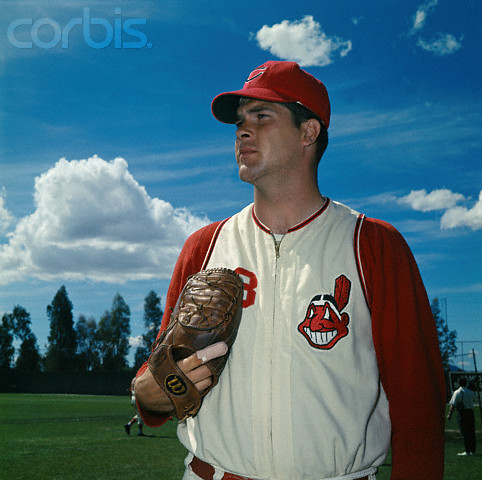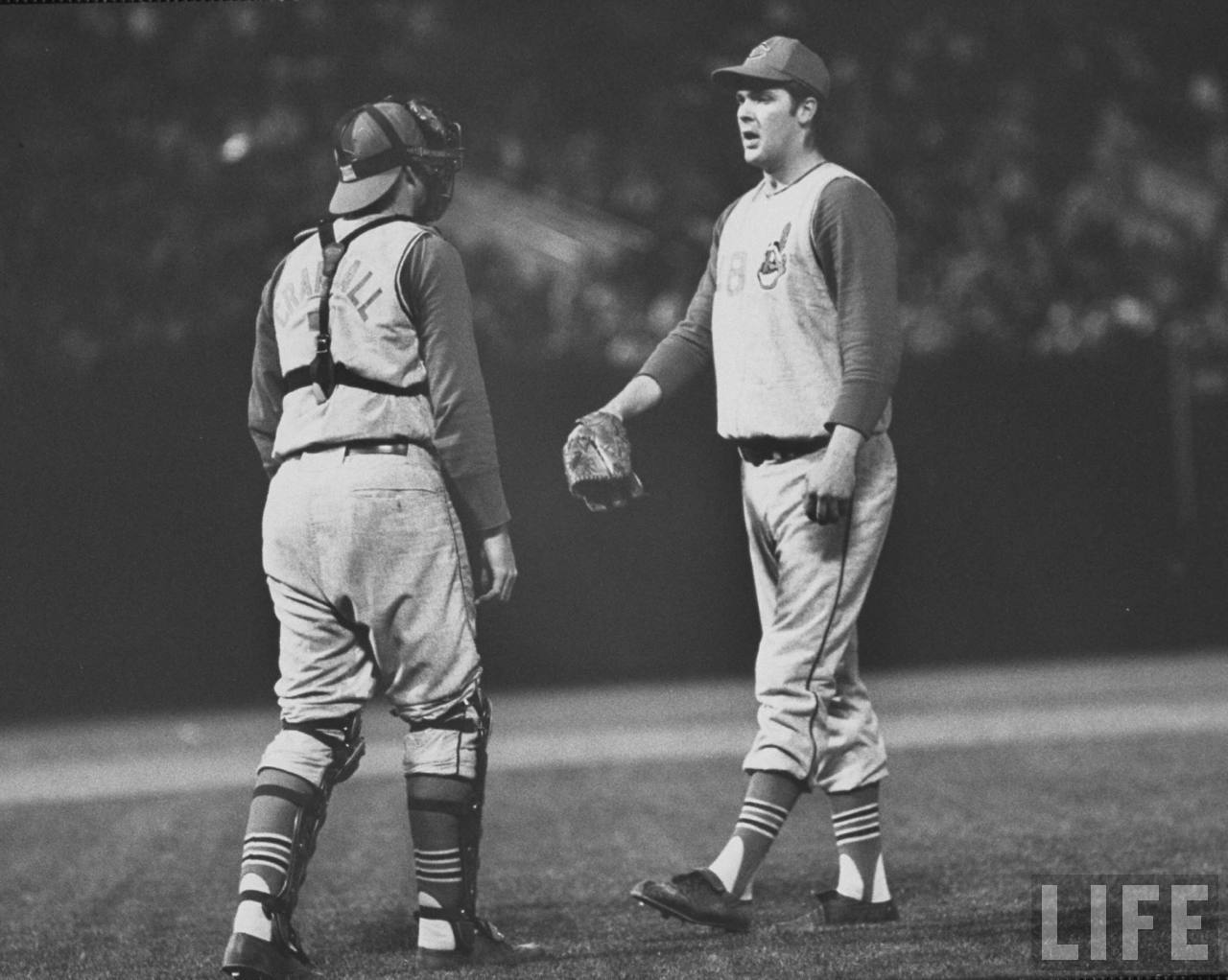 Indians Archive
Indians Archive  Blast From The Past: "Sudden Sam" McDowell
Blast From The Past: "Sudden Sam" McDowell
 When I am grilling in the backyard, my wife may ask how long it will be until the meat is ready. I'll hold my cigar in one hand, measure the remaining length with the index finger and thumb of my other hand, and say, "This long." She thinks I am hilarious (note: sarcasm alert). Of course, my wife is also familiar with one of my favorite admonitions from the television show, Cheers. Again, while holding the index finger and thumb a couple of inches apart: "Hey, don't ever do this to a guy, in public!"
When I am grilling in the backyard, my wife may ask how long it will be until the meat is ready. I'll hold my cigar in one hand, measure the remaining length with the index finger and thumb of my other hand, and say, "This long." She thinks I am hilarious (note: sarcasm alert). Of course, my wife is also familiar with one of my favorite admonitions from the television show, Cheers. Again, while holding the index finger and thumb a couple of inches apart: "Hey, don't ever do this to a guy, in public!"
That rule to live by came from Cheers bartender Sam Malone. In the show, "Mayday Malone" was a retired major league pitcher whose career was hampered by his alcoholism. Sam Malone's past struggle with binge drinking was loosely based on the playing career of a Cleveland Indians star from the 1960s, Sam McDowell.
Star pitcher. Career cut short. Could have been a Hall-of-Famer if it hadn't been for the drinking. That's what one commonly hears about Sam McDowell. But was the drinking the cause of his troubles, or perhaps one result of inner turmoil?
Sudden Sam was a left-hander signed by the Tribe out of high school, with a six-figure bonus. This was a huge amount of money for 1960. He was rushed to the majors, and started a game in 1961 (the year Cleveland writer Bob Dolgan gave him his immortal nickname). He had control problems, walking almost seven batters per nine innings. He threw uncommonly hard- he once broke three ribs while trying to put a little extra on a pitch. He bounced between the big league club and the minors for a couple years, and began to be more consistent by 1964.
 It was said that Sam McDowell was able to throw a baseball at 108 miles per hour. Writers speculated that he was almost as fast as Bob Feller, and Sandy Koufax in his youth. There was some unchallenged sentiment that he was faster than the legendary Walter Johnson.
It was said that Sam McDowell was able to throw a baseball at 108 miles per hour. Writers speculated that he was almost as fast as Bob Feller, and Sandy Koufax in his youth. There was some unchallenged sentiment that he was faster than the legendary Walter Johnson.
McDowell began a period of domination in the American League in 1965. His ERA was an AL-leading 2.18. He struck out 325 batters, which was fourth-best in history at the time. His 10.71 strikeouts per nine innings that year - occurring during an era when hitters viewed low strikeout totals as a source of pride - was a then-MLB record, lasting until Dwight Gooden's unbelievable 1984 season.
From 1965 through 1971, Sudden Sam was an All Star six times.
In 1966, he led the league in shutouts and in strikeouts, despite an arm injury during the season. He threw back-to-back one-hitters and was named "Pitcher of the Year" by The Sporting News.
In 1967, he finished second in strikeouts to Boston's Jim Lonborg.
In 1968 and 1969, he again led the league in strikeouts.
In 1970, he won 20 games and was again named "Pitcher of the Year".
Cleveland Indians fans voted Sam McDowell the Cleveland Indians Player of the Decade.
In 1971, Sam McDowell's record dropped to 13-17. Although his ERA was 3.40 (not bad even for that era), his act had worn thin with the Indians. Prior to the 1972 season, he was traded to the San Francisco Giants for Gaylord Perry and Frank Duffy. Duffy did hit for average during some of his six years with the Tribe, but his true worth was as a top defensive shortstop.  Perry won 24 games for the last-place Indians in 1972, and won his first Cy Young award. He was a box office draw during a long personal winning streak that year, and he had three solid seasons with the Tribe. Sam McDowell bounced back and forth from the Giants to the Yankees (twice), and then to his hometown Pittsburgh Pirates before he found himself unwanted by Major League baseball. Trading their Player of the Decade turned out to be one of the best moves the Cleveland Indians ever made.
Perry won 24 games for the last-place Indians in 1972, and won his first Cy Young award. He was a box office draw during a long personal winning streak that year, and he had three solid seasons with the Tribe. Sam McDowell bounced back and forth from the Giants to the Yankees (twice), and then to his hometown Pittsburgh Pirates before he found himself unwanted by Major League baseball. Trading their Player of the Decade turned out to be one of the best moves the Cleveland Indians ever made.
Alcohol (and amphetamines and barbiturates, as McDowell later admitted) was blamed for Sudden Sam's flameout. He played during a time when players respected those who could do some hard drinking one night, and then come out the next day and have a good game. McDowell fell into a cycle of addiction, and has admitted that he could have been a better player had he not been a drinker.
However, there seemed to be something deeper inside Sam McDowell which was holding him back. He seemed to have an inner conflict during his baseball career. Despite his ability, Sam didn't like baseball much in his youth; he played hooky from baseball, and he enjoyed football. Sam's father, a steel worker, wanted his son to have more than he had, and when scouts indicated the level of baseball talent Sam had, his father moved him in that direction.
During his professional career, Sam exhibited his obsessive-compulsive nature, which he acknowledged later in life. His interests seemed a mile wide and not very deep: collecting and building guns (as many as 185 at one point in time), constructing model boats inside bottles, training German shepherds, shooting pocket billiards, painting. He ran a pizza parlor, a pool hall, and owned a guitar distributorship. He was a salesman for an organic cosmetics company.
Sam was liable to say anything to anybody. He'd contradict himself at various times when talking with reporters. For example, he'd say he didn't care about strikeouts and then say it's what he was concentrating on. He said he never lost his temper, and then said he once got so angry with an umpire that he threw the ball into the upper deck. He supposedly would never throw at a batter, but then insisted he'd throw at his mother if she dug in against him. Indians players and management generally treated him as a "mischievous child who finds it impossible to take much of anything in life too seriously." (Sam of 1,000 Ways, Sports Illustrated, Pat Jordan, August 17, 1970)
Tribe announcer Herb Score, by all accounts a kind and gentle man, seemed irritated with Sam McDowell's lack of competitive fire. Score, on McDowell's varied interests:
"To be great at anything, you have to give up a lot. Some guys just don't want to make the sacrifice. They'd rather do great now and then than be great permanently."
(Sam of 1,000 Ways, Sports Illustrated, Pat Jordan, August 17, 1970)
 Many observers were exasperated at the way Sam McDowell would challenge top hitters such as Harmon Killebrew and Carl Yastrzemski with his dominating fastball, but often try to get lesser hitters out with off-speed pitches. It became apparent to some that either McDowell was bored with getting easy outs, or was afraid to succeed.
Many observers were exasperated at the way Sam McDowell would challenge top hitters such as Harmon Killebrew and Carl Yastrzemski with his dominating fastball, but often try to get lesser hitters out with off-speed pitches. It became apparent to some that either McDowell was bored with getting easy outs, or was afraid to succeed.
Herb Score, on hard throwers throwing off-speed pitches:
"A change can be an effective pitch, but only to a good hitter, to get his timing off. A bad hitter can't hit a good fastball. Throw him a change and you do him a favor." (Sam, You Make the Ball Too Small, Sports Illustrated, Jack Mann, May 23, 1966)
Some fans and reporters grew bitter at McDowell- one writer labeled him as having "a million dollar arm and a ten cent head."
One top hitter was particularly tough for Sudden Sam: Frank Howard. Once, Cleveland manager Alvin Dark moved McDowell to second base and let Dean Chance face Howard- a much better matchup for the Tribe. After the inning, McDowell resumed pitching. This arrangement seemed to suit Sam's preference for variety just fine.
Once Sam McDowell retired, he hit rock bottom, getting into barroom brawls and eventually losing his family. He ultimately became clean and sober. He was deeply in debt. Ever a man of principle, he vowed to pay back his debt in full. He lived up to this promise. He found personal fulfillment with the challenge of being a counselor and an alcohol rehabilitation worker.
For a man who has said he'd never wanted to be a baseball player, and who just didn't want to embarrass himself on the field, perhaps Sam McDowell's struggle with alcohol wasn't simply the cause of his fall from grace. As he has seemed to have viewed it in hindsight, maybe it was more the result of his obsessive-compulsive nature and low self-esteem. Regardless, like Sam Malone, Sam McDowell finally found peace after baseball.
Thank you for reading. Next week: Blast From The Past: Jack Graney. He was an Indians outfielder before and during the 1920 championship season. After which he became a legendary radio announcer for the Tribe.

- NBA Announces 2013-2014 Schedule
- Browns Ink Sharknado
- Sharknado A No-Show For Rookie Camp
- Trent Richardson Out Until Training Camp
- Browns Sign Brandon Jackson
- Carrasco Suspended Eight Games
- Browns Add to Wide Receiver Depth with David Nelson
- Browns Need to Learn from Past Draft Mistakes
- Browns Release Chris Gocong and Usama Young
- Browns Missing on Grimes Disappointing, But Not The End
The TCF Forums
- Official- Browns Coach Search/Rumors
mattvan1 (Tuesday, January 21 2014 3:37 PM) - Movies coming out
rebelwithoutaclue (Tuesday, January 21 2014 12:56 PM) - 2015 Recruiting
jclvd_23 (Tuesday, January 21 2014 12:38 PM) - The 2014 Offseason Thread
Larvell Blanks (Tuesday, January 21 2014 12:25 PM) - Chris Grant's first 3 drafts
Kingpin74 (Tuesday, January 21 2014 10:13 AM) - Mike Brown
YahooFanChicago (Monday, January 20 2014 11:15 PM) - 2014 Hoops Hockey Hijinx
jpd1224 (Monday, January 20 2014 4:44 PM) - 2014 Recruiting
jclvd_23 (Monday, January 20 2014 2:26 PM) - Wish List - #4 Pick
Hikohadon (Monday, January 20 2014 1:26 PM) - #1 overall pick Anthony Bennett
TouchEmAllTime (Sunday, January 19 2014 1:28 PM)



